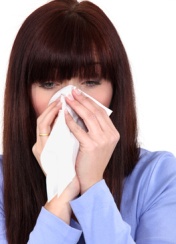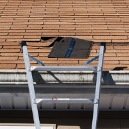Find a pre-screened local mold removal specialist Free Estimate
Find a Mold Specialist Now
Click or Call, Toll-Free 24/7
Mold Exposure Symptoms
You might be experiencing mold exposure symptoms if your allergies have been acting up lately or if you’ve been getting sick and don’t know why. People often don’t realize when they are experiencing mold health effects. Of course, if you see a lot of mold growing in your basement or your bathroom, you know you’ve got a mold problem. However, mold often grows in hidden places, like inside your walls or even inside your home’s air ducts, so you could have a mold problem and not even know it. Sometimes the first sign that you have a mold problem in your home is symptoms of exposure to mold.

Mold Exposure Symptoms
Even short-term exposure to mold can trigger some common mold health effects, similar to short-term exposure to other environmental allergens. Symptoms usually start out mild and increase over time, although some individuals are particularly sensitive to mold and they may experience moderate to severe symptoms from the beginning. Symptoms of short-term exposure to mold often include:
- Allergy symptoms, like itchy eyes, runny nose, sneezing, and a stuffy head
- Coughing
- Wheezing or shortness of breath
- Headaches
- Snoring at night, in people that did not previously snore
- Rashes, itchy skin
- Asthma attacks (1)
- Difficulty exercising
If you’re experiencing symptoms like these and you are aware of a mold problem in your home, let your doctor know because it may affect the prescribed treatment. If you’re having symptoms like these and don’t know why, especially if you’ve never had environmental allergy symptoms in the past, you might have a mold problem in your home that you don’t know about yet. Take some time to check for mold in your home.
Long-Term Mold Health Effects
Long-term mold exposure symptoms are more serious, and may include things like:
- Worsening of asthma symptoms, which may be long-lasting
- Development of asthma, or asthma-like symptoms, in people not previously diagnosed with asthma
- Chronic sinus infections
- Chronic sore throats
- Respiratory infections, like bronchitis or pneumonia
- Bleeding in the lungs
- Depression
- Chronic fatigue
- Memory loss
- Chronic inflammatory response syndrome
Long-term exposure to mold can cause other symptoms, as well. Different people respond differently, though the very young, the elderly, and people with pre-existing health problems are more susceptible to mold-related health problems. In some cases, mold-related health problems can be very serious and even lead to life-threatening complications.
Treatment for Mold Exposure Symptoms
Treatment for mold-related symptoms depends upon the specific symptoms you’re experiencing. For instance, allergy-like symptoms typically respond to antihistamines, while respiratory infections like bronchitis generally require antibiotics. Let your doctor know if you think your symptoms might be related to mold exposure, though, as that might affect treatment.
Keep in mind the fact that symptoms will usually continue even with treatment as long as you continue to be exposed to mold. In fact, symptoms may grow worse over time. In addition to the appropriate medical treatment, you’ll need to make sure all traces of mold are removed from your home in order to return to good health.
Mold Removal
Removing mold from the home is a complicated process and if you’re experiencing mold-related health problems, it’s not recommended that you try to remove mold on your own. Doing so only exposes you to more mold and may make your symptoms much worse. If you have a mold problem in your home, we recommend calling in a professional to assess the situation and handle the mold removal so that you can return to good health and avoid further mold-related health problems. They’ll provide a free inspection, so there really is no reason not to take advantage of the offer even if you’re thinking of doing the cleanup yourself. Click here for a list of qualified mold removal professionals in your area.
Return From Mold Exposure Symptoms To Our Main Symptoms Page
(1) Medicinenet: Mold Exposure Symptoms
Free Home Inspection By A Mold Removal Specialist
Search This Website
Recent Articles
-
See Our 5 Recommended Mold Removal Companies in Covington, KY
Apr 16, 25 12:59 PM
-
See Our 5 Recommended Mold Removal Companies in Wheaton, IL
Jun 20, 24 10:33 AM
-
See Our 5 Recommended Mold Removal Companies in Aberdeen, SD
Oct 08, 21 04:05 PM




